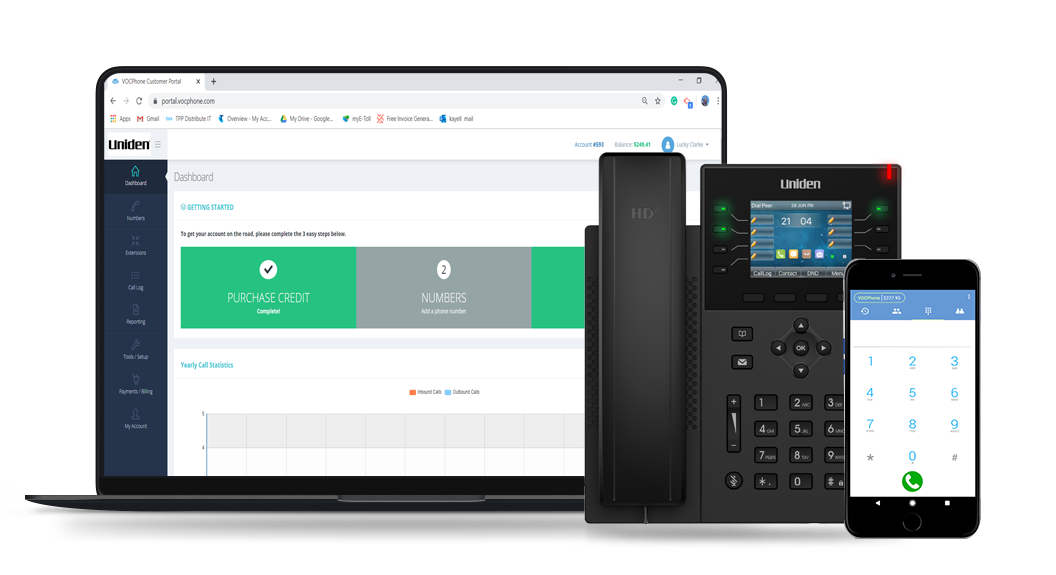
Is your outdated office phone system costing you leads?
Your phone system should help you win business, not lose it. Discover the silent ways outdated phones damage conversions and what to do instead.

Your phone system should help you win business, not lose it. Discover the silent ways outdated phones damage conversions and what to do instead.
Technology is moving fast, and businesses that keep up tend to stay ahead. If you're still relying on traditional landlines to run your operations, chances are your system isn't keeping pace with how your team and customers want to communicate.
Voice over IP phone systems (VoIP) let you make and receive calls over the internet. That means no outdated infrastructure, no surprise maintenance bills, and no being tied to the office desk phone. Whether you're a small business or a growing team, the flexibility is a game-changer.
But how do you know when it’s time to switch? Below, we’ve outlined four telltale signs it’s time to modernise your communications, plus why so many Australian businesses are already making the move.

Every missed call could be a missed sale, but outdated systems don’t make it easy to recover. Without voicemail forwarding or real-time alerts, missed calls often go unnoticed, and potential leads never get a follow-up. In many cases, these calls are from customers ready to act, but a delayed response sends them elsewhere. Cloud-based systems eliminate this gap with automated voicemail-to-email, call logging, and mobile alerts. Even if your team is unavailable, the system ensures every missed interaction is tracked, stored, and flagged for follow-up, turning near-misses into second chances to convert.
When leads call your business, they want help now, not after being transferred three times or stuck in an endless queue. Outdated office phone systems lack intelligent routing and call queueing features, resulting in long wait times and poor caller experiences. If it’s hard to get answers, most prospects won’t try again; they’ll go to a competitor. Cloud-based systems use auto-attendants, smart menus, and real-time team presence to route calls directly to the right person. This reduces friction, helps resolve queries faster, and keeps your lead engaged from the first ring to the final follow-up.
Without caller context, conversations start cold. Your team wastes time asking for basic information like name, previous issues, and purchase history, slowing down the call and damaging the experience. Traditional phone systems don’t sync with your CRM or customer data, so agents are left guessing. Cloud-based office phone systems fix this by pulling caller details directly from your CRM into live call screens. Your team knows exactly who’s calling, why, and what actions to take, allowing for faster resolutions, more personalised service, and smoother handovers that improve trust and close rates.
How long are prospects waiting on hold? What’s your team’s average response time? Which days have the most missed calls? If you can’t answer these questions, you’re flying blind, and outdated phone systems don’t help. They lack dashboards or data reporting tools, so patterns go unnoticed and optimisation is impossible. Cloud-based systems come with built-in analytics to track call activity, peak hours, missed calls, and agent performance. This data empowers your team to make smarter staffing decisions, uncover bottlenecks, and improve service where it matters most—helping convert more leads, faster.
Cloud-based apps let your staff answer and make business calls from any device—smartphone, tablet, or desktop. Whether your team is remote, on the move, or hybrid, they stay connected to the central phone system using a dedicated business number. This eliminates delays, improves responsiveness, and ensures your team is always reachable with a consistent caller ID and professional handling.
Click-to-call integrations connect your phones directly with platforms like HubSpot, so staff can dial leads directly from contact records. Each call is automatically logged with notes and timestamps, reducing manual admin work. This boosts efficiency, ensures accurate data, and allows for seamless follow-up based on customer history and previous interactions.
When a voicemail is left, cloud systems convert the audio to text and send it straight to the recipient’s inbox. No more logging in to check voicemails manually. This allows staff to scan and prioritise messages quickly, even during meetings or travel. It also improves accountability and delegation by making it easier to forward or respond to enquiries in real time.
Secure cloud storage enables businesses to record incoming and outgoing calls for future reference. These recordings are essential for team training, customer dispute resolution, quality assurance, and compliance in regulated industries. They also create a searchable archive of interactions, giving teams insight into customer needs, objections, and preferences.
This feature shows who’s available, who’s on a call, and who’s offline, and it does it all in real time. With presence data built into your call dashboard, receptionists and managers can route calls faster and avoid potential dead ends. It also helps manage staff availability more effectively during peak hours, reducing hold times and improving service consistency.
At Uniden, we help Australian businesses upgrade their communication systems without the complexity. Our cloud-based business phone systems come with powerful features designed to help your team respond faster, improve call quality, and convert more leads. Whether you’re a growing team or an established operation, we’ll help you turn your phones into a smarter, more reliable lead generation tool.

Every call is a chance to win or lose a customer. Make sure your system supports your sales, not slows it down.
Absolutely. Slow response times, missed calls, and poor routing all lead to missed opportunities. A modern system solves this.
Cloud systems offer mobile access, automation, and integrations that make communication faster and more efficient.
No. Most providers offer guided onboarding and simple setup to ensure minimal disruption during the switch.
Yes. Your team can access calls, voicemails, and extensions from anywhere via desktop or mobile apps.
Yes. Reputable systems use encrypted data, permission controls, and secure cloud storage to protect your communications.